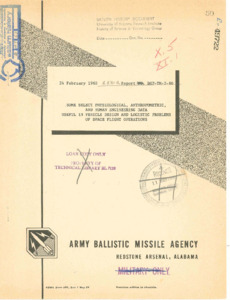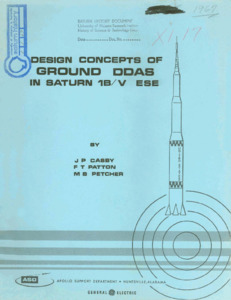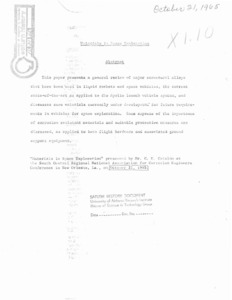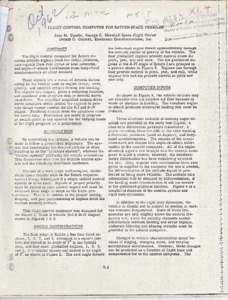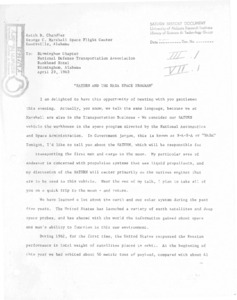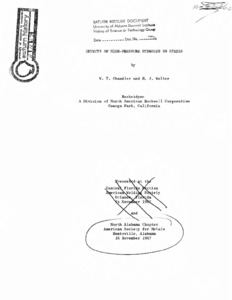
Browse Items (970 total)
Sort by:
-
"All Digital Simulation of Saturn I, IB, and V: Boost Vehicle and Guidance Control Systems."
The introduction notes, "The Saturn V launch vehicle is being developed by the National Aeronautics and Space Administration's George C. Marshall Space Flight Center for Project Apollo; Saturn I and Saturn IB vehicles are providing the early testing and support for Project Apollo. The nerve center of the Saturn is its guidance and control system. An airborne digital computer provides the link which closes both the guidance and control loops,making verification of the flight computer program of vital importance. During a powered flight this onboard digital computer program can be divided into four major parts:a) guidance, including navigation, b) control, c) vehicle sequencing, and d) computer telemetry." -
"Some select physiological, anthropometric, and human engineering data useful in vehicle design and logistic problems of space flight operations."
Report No. DSP-TM-2-60 31 p.; Pages which were blank (not scanned): 2, 26, 28 -
"Design Concepts of Ground DDAS in Saturn 1B/V ESE."
In the Saturn IB/V programs the sheer quantity of data required for computer processing and ESE display makes it necessary to provide an efficient data acquisition system. For much of the data originating in the launcher this requirement is satisfied by the Ground Digital Data Acquisition System (DDAS). This paper provides a technical description of the Ground DDAS with emphasis placed on the unique design concepts of this telemetry system. -
"Functional Management in NASA."
This is a Comment Edition of Historical Note No. 53 prepared by a summer employee of the NASA Historical Staff (APPH). The author has agreed to integrate comments and corrections submitted by critical readers, a normal process of validation for all historical reports and studies. -
"Propulsion : the key to space travel."
Cover has: P. D. Castenholz and H. K. Griggs, Advanced Systems, Advanced Projects Department. D. W. Hege, Manager, Advanced Projects. Paper regarding the importance of propulsion technology and the future missions that would require advancements in that field. -
"Materials in space exploration."
This paper presents a general review of major structural alloys that have been used in liquid rockets and space vehicles, the current state-of-the-art as applied to the Apollo launch vehicle systems, and discusses some materials currently under development for future requirements in vehicles for space exploration. Some aspects of the importance of corrosion resistant materials and suitable protective measures are discussed, as applied to both flight hardware and associated ground support equipment. -
"Flight Control Computer for Saturn Space Vehicles."
The flight control computer for Saturn receives attitude signals from the stable platform, rate signals from rate gyros or lead networks, and angle-of-attack information from body-fixed accelerometers or other sensors. -
"The Common Bulkhead for the Saturn S-II Vehicle: Unique Manufacturing Effort Adds to Space-Age Hardware Technology".
Presentation regarding the construction of Apollo and Saturn rockets. -
"Saturn and the NASA space program."
Given at the Birmingham Chapter National Defense Transportation Association. Focuses chiefly on moon-missions. -
"Effects of High-Pressure Hydrogen on Steels."
Hydrogen embrittlement of steels is hardly a new subject, but the effects of high-pressure hydrogen have been treated in detail only more recently and to a much more limited extent. Thus, most investigations of hydrogen embrittlement have been concerned with hydrogen in metals, while for the high-pressure hydrogen problem, we are more concerned with metals in(in contact with) hydrogen. I believe there is a difference and, certainly,different mechanisms of embrittlement are at least possible.; Presented at the Central Florid Section, American Welding Society, Orlando, Florida, 14 November 1967 and North Alabama Chapter, American Society for Metals, Huntsville, Alabama, 16 November 1967.

